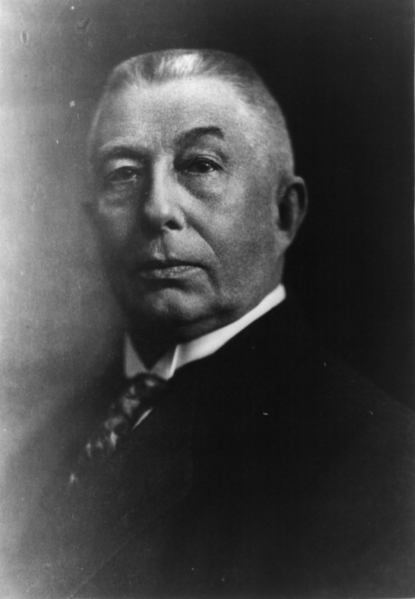<Back to Index>
- Economist Michał Kalecki, 1899
- Writer Henry Rider Haggard, 1856
- Prime Minister of the Netherlands Hendrikus "Hendrik" Colijn, 1869
PAGE SPONSOR

Hendrikus "Hendrik" Colijn (22 June 1869 – 18 September 1944) was a successful Dutch soldier, businessman and politician.
He was born in 1869 in the Haarlemmermeer to Antonie Colijn and Anna Verkuil, who had migrated to the Haarlemmermeer polder from the Land of Heusden and Altena for religious reasons. Colijn grew up in the Land of Altena.
At the age of 16, he went to a Military Academy in Kampen for officer training, where he graduated as a 2nd Lieutenant in 1892. In 1893, he married Helena Groenenberg and was sent to the Dutch East Indies. During his 16 years in the Dutch East Indies, he spent ten years in the Colonial Army, serving in the Aceh War as the lieuteant of J.B. van Heutsz, and six further years in the Colonial administration, having the same role towards van Heutsz when the latter became Governor General in 1904.
Colijn's letters to his wife from his period on Lombok reveal his participation in acts of brutality which by modern standards would be considered severe war crimes:
After his return to the Netherlands in 1909, he was elected as an Anti Revolutionary Party Member of Parliament for the district Sneek. (Before 1918, the Dutch voting system was the same as the British.)" I have seen a mother carrying a child of about 6 months old on her left arm, with a long lance in her right hand, who was running in our direction. One of our bullets killed the mother as well as the child. From now on we couldn't give any mercy, it was over. I did give orders to gather a group of 9 women and 3 children who asked for mercy and they were shot all together. It was not a pleasant job, but something else was impossible. Our soldiers tacked them with pleasure with their bayonets. It was horrible. I will stop reporting now."
In 1911 he was appointed Minister of War and revised the Dutch Selective Service System. From 1914 to 1922 he served as CEO for the Bataafse Petroleum Maatschappij (BPM). In 1925, he also became CEO of Royal Dutch Shell. In May 1918 he acted as an intermediary between the British and Kaiser Wilhelm II of Germany to arrange an armistice, resulting in the Kaiser getting refuge in The Netherlands.
In 1922 he accepted the political leadership of the Anti Revolutionary Party (Calvinist) from Dr. Abraham Kuyper. Between 1925 - 1926 and 1933 - 1939 he served five times as Prime Minister. During the 1930s his government faced the effects of the Great Depression, which took a heavy toll on the Netherlands. Colijn's government responded to the economic crisis with a very strict fiscal policy, which may have further weakened the Dutch economy. Colijn's decision to adhere to the Gold Standard until 1937, long after most of the trading partners of the Netherlands had dropped it, also played a role in lengthening the economic crisis. In 1939, his latest cabinet, with Protestant and liberal ministers but without Catholic ministers, lasted only three days before a government crisis. From 1927 - 1929, he also was head of the Dutch delegation to the League of Nations in Geneva.
After the Dutch defeat in the Battle of the Netherlands in 1940, he published an essay entitled “On the Border of Two Worlds” (Op de grens van twee werelden) in which he called for accepting German leadership in Europe. This was immediately after the Royal House had fled to England, leaving him behind. His view was influenced by the tremendous show of force the German blitzkrieg had shown, and by the relative weakness of the Allied forces. Soon thereafter, he tried to organize political resistance but was arrested in June 1941 and taken to Berlin for interrogation. The Germans tried to have him confess that he had conspired with the British to invade the Netherlands to serve as an excuse for the German invasion. Late in the war after the tide had turned against the Germans, Himmler wanted to keep Colijn available as a possible intermediary with the British as he had done earlier for the Kaiser. In March 1943 he was put under house arrest in a remote mountain hotel in Ilmenau (Thuringen), Germany, where he died on 18 September 1944.